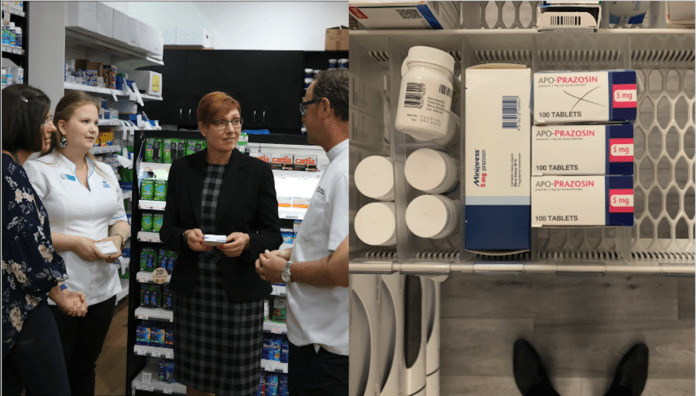In another big week for pharmacist scope of practice changes, continued dispensing arrangements have expanded in Tasmania, and pharmacist-initiated travel vaccines and a UTI pilot were announced in the ACT.
Tasmania has become the first jurisdiction to restore continued dispensing following rollback of the initiative last year.
From Monday 6 March 2023, Tasmanians who urgently require most Prescription Only Medicines can access a one-off supply from their local pharmacy if they are unable to obtain a renewed prescription.
As Tasmanian pharmacists await a whole scope of practice review, Premier Jeremy Rockliff announced patients can now access hundreds of new medicines – including antidepressants, anticoagulants and anti-epilepsy medicines, and medicines for the management of chronic conditions such as diabetes and heart disease.
This is a ‘fantastic step forward’, said Ian Magill MPS, who owns a pharmacy in Geeveston – one of Australia’s most southern towns.

With long wait times at the only medical practice in town, delayed access to medicines has had devastating health impacts on some patients – including one who experienced extreme anxiety and an elevated heart rate after 3 days without antidepressants.
‘It’s going to decrease the chance of people stopping their medications because they can’t get access to them,’ Mr Magill told Australian Pharmacist. ‘Continuation of therapy is paramount to achieving the best outcome for patients.’
How it works
All Schedule 4 medicines, except S4D medicines, which are specified psychotropic substances, have now been included in regulation 48 of the Tasmanian Poisons Regulations 2018.
This regulation specifies that the quantity of the medicine supplied by continued dispensing must align with the amount dispensed in the previous prescription. While this is typically 1 month’s supply, it could be greater for certain medicines or formulations.
Eligibility requirements are mostly consistent with the National Health (Continued Dispensing) Determination. However, there is an additional provision added to regulation 48 that ‘allows a prescriber after considering the clinical safety of a patient, to specify on an individual prescription that continued dispensing must not occur for that medicine’. The practical application is this information will need to be included on the medicine label for it to be able to be communicated in the event of a continued dispensing request.
In a nation-first, Tasmanian pharmacists will be able to supply a month of medicines after a patient’s prescription runs out and a GP is unavailable. pic.twitter.com/i3zb7r4Xtk
— RockliffTeamMedia (@RockliffTeam) March 1, 2023
‘Pharmacists will need to verify previous and recent supply of the medicine to that patient – so if you’re not going to your regular pharmacy, keeping the empty box of the previous supply will help the pharmacist help you,’ added PSA Tasmanian President David Peachy.
Further change needed
Despite the expansion, only 150 medicines will be available via Pharmaceutical Benefits Scheme (PBS) continued dispensing, as per the reduced list when the number of medicines eligible for PBS continued dispensing shrunk from 906 to 168 mid last year.
For Mr Magill, the biggest concern around the updated regulation is equity of access. ‘Concession card holders with a valid PBS script, for example, can’t get their medicines at a PBS price via the expanded list at the moment,’ he said.
The PSA will continue to advocate for equitable access to affordable medicines for all patients in all states, said PSA Tasmania State Manager Ella van Tienan.
‘Firstly, we need to get all states to increase the range of substances pharmacists are able to offer under continued dispensing, in line with Tasmania,’ she said.
‘The second step will be for the Federal Health Department to broaden the PBS continued dispensing list back to the full range [so] patients [have] both timely and affordable access to medicines.’
Canberra pharmacists to administer travel vaccines
For Canberra-based community pharmacist Alica Martin MPS, it’s common for patients to present with questions about the vaccinations they need before travelling.
‘They get their flu and COVID-19 vaccine here, and they’ll ask “I’m travelling, can you [administer] this vaccine?” and I have to say no,’ she said.
From 17 March, however, Canberrans will be able to receive the hepatitis A, hepatitis B, poliomyelitis, typhoid, and herpes zoster vaccines at their local pharmacist. Also included in the vaccine expansion are the human papillomavirus and Meningococcal ACWY vaccines.
‘The average Australian visits a pharmacy 18 times each year. That’s 18 opportunities to impart a health message and encourage them to get up to date with their vaccinations,’ said PSA ACT President Olivia Collenette, who joined ACT Health Minister Rachel Stephen-Smith MLA to make the announcement on Friday morning (3 March).
Streamlining the process will help more patients get vaccinated before they travel, thinks Ms Martin.
‘When you’re travelling, you’re already trying to organise so many things,’ she said. ‘Now, people aren’t going to miss out because they weren’t able to get a GP appointment.’
At this stage, pharmacists in the ACT will still only have National Immunisation Program (NIP) access to influenza vaccines for patients aged 65 and over, with the new vaccines available only on private market supply – out of step with both NSW and Victoria.
While PSA will continue to advocate for expanded NIP access, Ms Collenette reflects that for many of her patients, GP wait times, not cost, are the biggest barrier to access.
‘It’s incredibly difficult to see a GP and there are just about no bulk billing doctors in Canberra anymore,’ she said.
‘Not only would you have to wait for an appointment with your doctor, you also have to pay for the vaccine to be administered.’
The easy access afforded by community pharmacies, along with longer operating hours means more patients will have access to vaccines when they need them.
‘We anticipate this will relieve some pressure on GPs but also potential emergency department [presentations] for preventable diseases,’ Ms Collenette added.
NSW UTI pilot extended to ACT
The announcement also revealed that patients in Canberra will soon be able to access pharmacist-prescribed antibiotics for urinary tract infections (UTIs) under the New South Wales trial program.
As a pharmacist in an extended-hours pharmacy, Ms Martin anticipates the pilot will be ‘really beneficial’.
‘We’ll get a woman who comes in at 8 pm with clear symptoms of a UTI,’ she said. ‘After ruling out red flags, you can’t give them what they need – even though they can’t see a doctor at that time and you know 3 days of trimethoprim will do the job.’
That is set to change after the pilot commences in the ACT mid-year in a limited number of sites, said Ms Collenette.
‘[Initially] it will rollout in five pharmacies across Canberra in a range of community pharmacy types, along with [various] opening hours,’ she said.
It is anticipated more pharmacies will join the rollout as the pilot progresses.
‘Hopefully, we show very quickly that pharmacists are effective and safe, and then it’s put into practice for [all pharmacists] to be able to provide antibiotics for uncomplicated UTIs,’ said Ms Collenette.
To refresh your knowledge around using your professional judgement to supply medicines via continued dispensing or update tour vaccination skills, access PSA’s Guidelines for the Continued Dispensing of Eligible Prescribed Medicines by Pharmacists and Immunisation and refresher resources.



 Professor Margie Danchin[/caption]
Professor Margie Danchin[/caption]

 Dr Peter Tenni[/caption]
Dr Peter Tenni[/caption]
 How should we deprescribe gabapentinoids, according to the Maudsley Deprescribing Guidelines[/caption]
How should we deprescribe gabapentinoids, according to the Maudsley Deprescribing Guidelines[/caption]



 Pharmacists have always prescribed, but they have the potential to prescribe much more
Pharmacists have always prescribed, but they have the potential to prescribe much more




